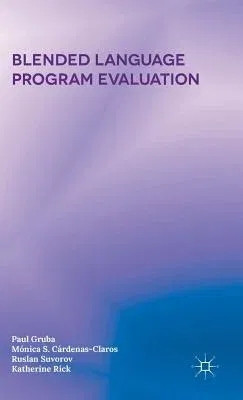Paul Gruba
(Author)Blended Language Program Evaluation (2016)Hardcover - 2016, 29 February 2016

Qty
1
Turbo
Ships in 2 - 3 days
In Stock
Free Delivery
Cash on Delivery
15 Days
Free Returns
Secure Checkout

Print Length
248 pages
Language
English
Publisher
Palgrave MacMillan
Date Published
29 Feb 2016
ISBN-10
1137514361
ISBN-13
9781137514363
Description
Product Details
Book Edition:
2016
Book Format:
Hardcover
Country of Origin:
NL
Date Published:
29 February 2016
Dimensions:
21.59 x
13.97 x
1.6 cm
ISBN-10:
1137514361
ISBN-13:
9781137514363
Language:
English
Location:
London
Pages:
248
Publisher:
Weight:
462.66 gm